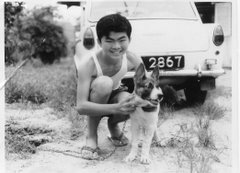 The traveling party comprised of my parents, my uncle and myself. I was six years old at that time.We traveled in a coastal steamer which carried cargo but some cabins were reserved to carry passengers. It was December period, and seafarers called the monsoon wind as 'fung kong'. With our ship tossing around in the choppy seas, some of us staying in the cabin near the ship's bow vomited.
The traveling party comprised of my parents, my uncle and myself. I was six years old at that time.We traveled in a coastal steamer which carried cargo but some cabins were reserved to carry passengers. It was December period, and seafarers called the monsoon wind as 'fung kong'. With our ship tossing around in the choppy seas, some of us staying in the cabin near the ship's bow vomited. Not all were bad experiences though. The unforgettable sight of flying fishes leaping above the waves made me quite excited. I heard splashes at night and thought sharks were following the ship, but pleasantly found out in the morning that these lovely creatures were in fact dolphins.
Not all were bad experiences though. The unforgettable sight of flying fishes leaping above the waves made me quite excited. I heard splashes at night and thought sharks were following the ship, but pleasantly found out in the morning that these lovely creatures were in fact dolphins.Our one way trip took about two days with the ship hugging closely to the coastline. On the return trip, we were smart enough to book cabins at the stern, with no rocking about. Some passengers tried to save money by sleeping on an elevated platform on the deck, which offered little privacy. Though I was a small eater, when traveling by sea, with cold wind blowing across the deck, my appetite increased two-fold, despite the simple meals consisting of only vegetables, soup and rice.
My aunt had an emotional reunion with her siblings when we arrived at her home, a big colonial style bungalow, on high concrete stilts, not unlike those British residences in Singapore. The funny part was that, we had all our meals under this house. My Hainanese cousins, many older than I, gave us a rousing welcome. I particularly loved the breakfast which consisted of mouth-watering nasi lemark, and different varieties of delicious kuehs.
My mother bade a tearful farewell and reminded my aunt to visit us in Singapore; which she did a few years later. It was her last trip before she passed away. When she was in Singapore, Chun See had only just been born - a cute toddler, as you can see from the photo below. It must be around 1953, because in the photo, Chun See looked about a year old, and our youngest brother James was not even born yet.






16 comments:
A wonderful story Chun Chew, and its the sort of journey which now no longer exists, I can't imagine that many cargo ships with a few cabins for passengers are available and of course there are now so many faster ways to travel - a pity in a way.
Brian - This was post war Singapore and poverty was quite wide-spread. My father and uncle worked in the British Naval Base and were therefore gainfully employed. My father was in fact financially drained and the old kampong house was in a very bad shape. My father decided to build a new wooden house (picture above) but could not afford the building cost which easily came up to about $5000.00, a sizeable amount at that time. Luckily my batchelor uncle staying with us was able to loan my father a tidy sum to build a new house. All of us were excited moving into this new home. Later on my uncle got married to a Johore girl (Pontian) and move out to stay at a rented flat in Rangoon Road where his first daughter was borned.
Wah, Chun See looked so serious even at such a young age. :P
Thanks for the story, Chun Chew. Any younger (and bigger) photos of Chun See to show?
A wonderful story .Reminds me so much of my family.
It is the 'ties that binds'that shape the way we are.
Treasure them.
Wish that our younger generation will appreciate them as we do.
M
Chun See, Chun Chew:
I like to get a feel of what it takes for your siblings to have such good binding ties over the years. I do believe that this bonding has also caught-on with your next generation, the cousins.
Most people I know and observe find that when siblings are young and growing-up, they are close together. The moment they marry and start a family, the distance begins to creep-in and given the circumstances in Singapore, bonding becomes like a "once-a-year" when grandparents celebrate a birthday or when there is Lunar New Year.
Will you share your thoughts on this?
Victor, again asking to see other people's photos when all you are willing to show of yourself are your funny feet.
Hey, mine may be funny feet but they are happy feet. I mean, I am happy with showing just my feet.
Zens' comments on the post war situation remind us all of how much has changed since the end of WW2 - for younger Singaporeans it must be difficult to imagine how it was then - same in the UK I think, when i watch old films set in the 1950s when I was a small child its sometimes like watching something from historical times, or even a different planet!
Victor - Chun See is zealously guarding his childhood photos. You must use all your persuasive power to let him show you those master pieces. A tip here, if there were baby shows then, Chun See could, I think, easily be a champion baby.
Brian - I can still remember in the early fifties, when Britain and France were involved in the Suez canal crisis, after the Egypt nationalised the Suez canal. UK issued ultimatum and force was used (bombing and troops were airdropped into the canal zones). Big blow-up was expected. Singapore newspapers were plastered with War headlines. My teacher explained to the class (all primary students) that although the British people did not agree to their govt action (PM Sir Antony Eden) they still responded spontaneously to the national military call-up, ready for national duty for the country. Luckily full scale war was later avoided through diplomatic effort.
Peter - You are absolutely correct to say when siblings got married their bond seems to weaken. Being the eldest of the Lam family, I gel the family ties through regular get-togethers. When coming to making major decisions, we leave our wives out discreetly, in the case of my sister pat - her husband. Such action seems discriminatory, but effective in keeping out unwanted interference, but I must add that this is the Lam's way of doing things. Other families may have their own unique ways of bonding their siblings.
It seems to me that life back then, though difficult was full of adventure! Thanks for the heart-warming story, Chun Chew.
It's true most siblings grew apart when they start families of their own. I was close to my younger sis. Now, we hardly communicate even though we live in the same street!
BTW Chun See, Victor was very close to uploading his foto. Then something happened.... and he thanked his lucky star for not having uploaded it. Sigh... the wavering monkey.
From my own experience, families grow apart when both the aged parents pass on. When they are around, their children (we) all visited them at least a few times a year - during occasions like birthdays, festivals and Chinese New Year. During such get-together sessions, sibling bonding is forged. With the passing away of the parents, the eldest (like Zen) should rightfully take on this role. If that replacement fatherly role is absent, than the family is likely to grow further and further apart.
Zen has a good point - someone must be the "organizer" or to be proactive. It could be the eldest or youngest but that someone must have the passion and leadership to do it.
I sometimes whether the parents themselves are at fault. I have witnessed where parents fail to create the opportunities to bring cousins together. Though the get-together takes place, somehow everybody heads for the table for food and gossiped here/there, and then everybody heads for home.
In my case, my parents created that opportunity. This opporunity was outside the traditional grandparents' occasions. We were brought to our cousins' house (and vice versa) on a Sunday for 1/2 a day. Whilst our parents talked, we kids played in the room and on the street. I think this took place when we were between 5 and 12 years, then there was a hiatus.
Fast forward 25 years later, the cousins who are now parents themselves still get to each other's house, bringing the kids along. The parents still talk to each other as if they were kids themselves. They don't just do the "Hi,..... how's things?.... Wah big time already...... My child just got # 1 position in standard....."
What I am illustrating here is that if we leave it to the presence of grandparents as the sole reason for getting together, then when they depart everything stops.
Are there any other suggestions from readers?
My aunt, was the eldest of the Ng clan, with my mother being no.5. She was a soft-spoken lady and a benign person. My datuk uncle was at one time a very successful businessman, holding the agency for Coca Cola in Kuantan. According to my mother my uncle favourite pastime was hunting (tigers and crocodiles!). An unfortunate incident happened to my Aunt, one of his sons was executed by the Japanese during the war. This tragic incident must have broken her heart.
This is one of the reasons I make the trip with my family to Ipoh every year. When my children were small, they enjoyed it so much - playing with their cousins. I do get a bit bored and prefer more exotic places. Now that they are bigger, its less of a thrill but still, watching the old videos were great fun and when they grow up they will have their own precious memories.
But I guess once my mother-in-law leaves us, and the children grow older, these gatherings will be reduced.
The Japanese used to say even if they are in a group of three people, they would appoint a leader. This reminded me of an old Japanese film, depicting a motley group of ten Japanese retreating from advancing Russian forces in Manchuria during the tail-end of WWII. They appointed a leader, and if the leader got killed, they appointed another one. All must follow the leader's orders. Finally only about three persons survived the whole ordeal.
Post a Comment